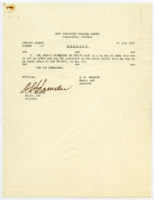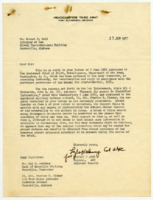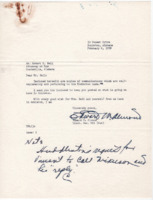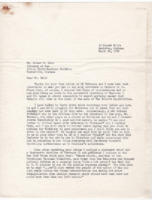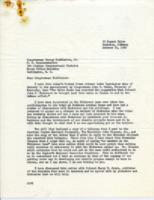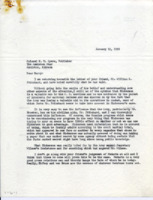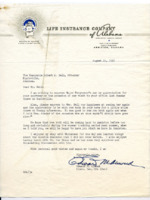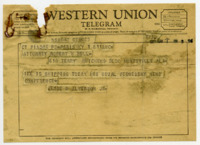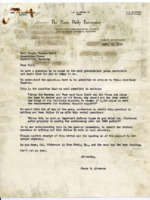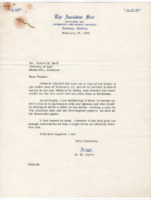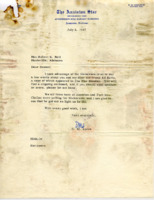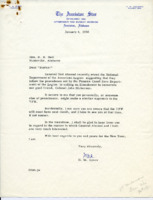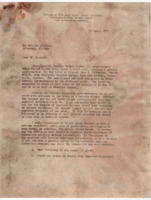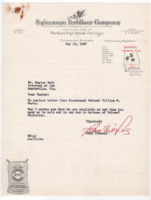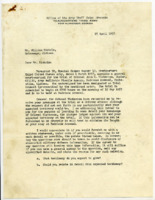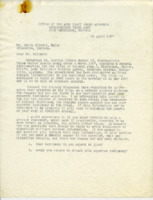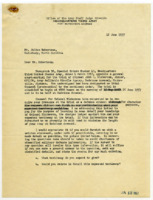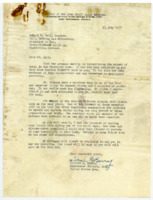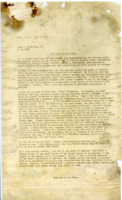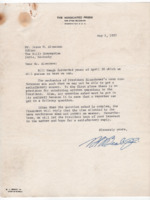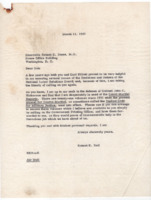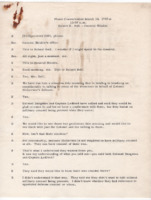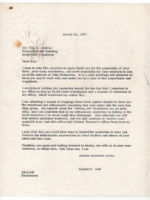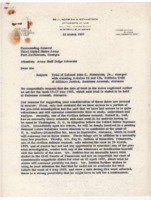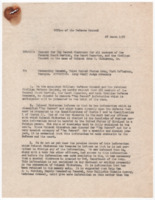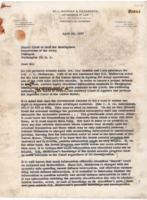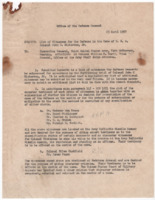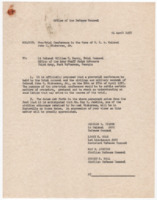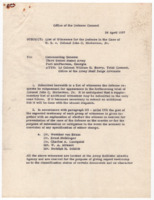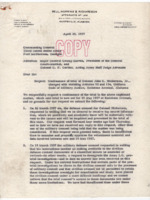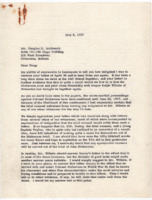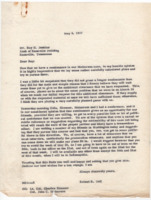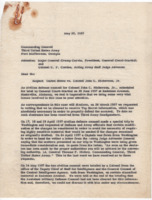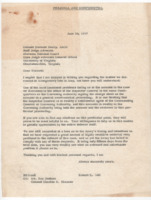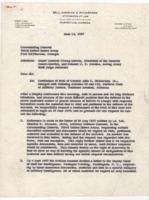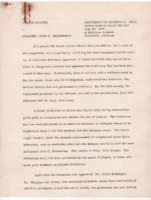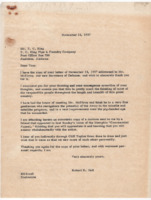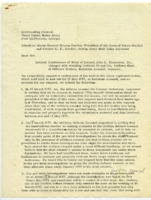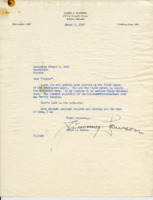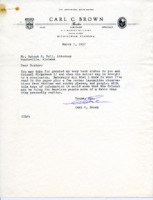
Browse Items (213 total)
Sort by:
-
Special Orders Number 135.
This is an extract from Special Orders Number 135 regarding Colonel John C. Nickerson, Jr. -
Letter to Robert K. Bell from Col. Forrest J. Agee.
Agee writes this letter in response to Bell's June 3, 1957 letter to the Assistant Chief of Staff, Intelligence, regarding request for access to classified information. He states that the request is "not favorable considered" and the necessary information could "readily be obtained from direct testimony." -
Correspondence between Robert K. Bell and Edward M. Almond.
These letters include information pertaining to the Nickerson case. Almond expresses desire to "get something in motion to subdue the unnecessary and trivial expressions of � General Medaris". The letters also mention various correspondence that was included in the exchange of information. Both men advocate for the "cause" of Colonel Nickerson's actions. Bell was Nickerson's attorney during his trial. -
Letter to Robert K. Bell from Edward M. Almond.
Almond writes in reponse to Bell's February 18 letter regarding Medaris and other information of the Nickerson case. -
Correspondence between George Huddleston, Jr., Lieutenant General Edward M. Almond, and Carl Vinson.
Almond writes to Huddleston in an attempt to get Nickerson brought back from exile in Panama. Huddleston agrees with Almond in his response and says he will do his best to advocate for Nickerson's testimony on the missile program and will bring the matter to the attention of the Chairman, Honorable Carl Vinson. Huddleston's following letter of January 25, 1958 states that Carl Vinson does not believe having Nickerson as a witness is advisable. Huddlestone attaches a copy of Vinson's letter that explains this. Almond writes in response to the decision with his thoughts on the matter and believes that "all service officers will step gingerly in their testimony" so as not to "stick their necks out as General Gavin and Colonel Nickerson have already done." -
Letter to Harry M. Ayers from Edward M. Almond.
Almond writes to Ayers stating that he believes Nickerson is still a "valuable man to the U.S. services" and thanks Ayers for his interest in the matter. -
Letter to Robert K. Bell from Edward M. Almond.
This letter thanks Bell for the courtesy extended to Almond and Major Fergusson's visit to his office and expresses well wishes to Bell's wife. Almond details a few aspects of his stay in Huntsville in this letter. -
Telegram to Robert K. Bell from Jesse M. Alverson, Jr.
Alverson, publisher at The Paris Daily Enterprise, telegrams Bell about President Eisenhower. -
Correspondence between William J. Waugh and Jesse M. Alverson.
Alverson writes to Waugh to submit a question to the asked at the next presidential press conference along with a follow-up question. The question regards the President's opinion on the missile program and Colonel Nickerson's actions. Waugh responds that the Washington bureau will do what it can to get her questions answered. -
Correspondence between Robert K. Bell and Harry M. Ayers.
In response to Bell's February 13 letter from Edward Almond, Ayers informs Bell that he is attempting to find someone who would write a letter to newspaper publications in agreement with their opinion that Medaris is taking too much credit for his work. Bell responds that he is skeptical Ayers would find anyone as Medaris could make their life a "rather miserable existence". -
Letter to Robert K. Bell from Harry M. Ayers.
Ayers writes to Bell about an article written in The Anniston Star about him and the Nickerson trial and congratulates Bell for getting Nickerson "out as light as he did." -
Letter to Robert K. Bell from Harry M. Ayers.
Ayers writes regarding a wire from General Edward Almond to the National Department of the American Legion "calling on Eisenhower to exonerate our good friend Colonel John Nickerson." -
Letter to William Nichols from William G. Barry.
This letter requests William Nichols to be present at the trial as a defense witness and a written statement from Nichols to detail what his testimony would be. The letter includes questions for Nichols to answer in the written statement. -
Correspondence from William Nichols to Robert K. Bell containing a letter from William G. Barry.
William Nichols writes to Robert K. Bell, enclosing a letter from Lieutenant Colonel William G. Barry. The enclosed letter requests William Nichols' presence at the Nickerson trial at an undetermined date. It states that a subpoena will be sent when a date is set. -
Letter to William Nichols from William G. Barry.
Letter requests William Nichols' presence at the trial of Colonel John C. Nickerson, Jr. It also includes questions Nichols is to answer in a written statement and an anticipated range of dates he will be expected to give his testimony in court. -
Letter to Mayor Ralph Wiltsie from William G. Barry.
Letter requests Ralph Wiltsie's presence at the trials of Colonel John C. Nickerson, Jr. It also includes questions Wiltsie is to answer in a written statement and an anticipated range of dates he will be expected to give his testimony in court. -
Letter to Julian Robertson from Lt. Col. William G. Barry.
This letter requests Robertson's presence at the Nickerson trial as a defense witness and a written statement in response to several questions listed in the letter. -
Letter to Robert K. Bell from Lt. Col. William G. Barry.
Barry writes to Bell to inform him that the Nickerson case has been transcribed and was forwarded to Washington the previous day. He expresses gratitude towards the manner in which Bell extended to him and hopes to renew their acquaintance in the future. -
Stipulation of the testimony of John A. Baumann.
Written testimony of John A. Baumann, employee of the Radio Corporation of America, presented if he were "present in court". No signatures of the defense counsel, accused, or trial counsel are on the document. -
Letter to Jesse M. Alverson from W. L. Beale, Jr.
Beale writes to Alverson, the editor of The Daily Enterprise, regarding potential questions Alverson wants to ask President Eisenhower. -
Letter to Robert E. Jones from Robert K. Bell.
Robert K. Bell writes to Senator Bob Jones for help and information regarding the Nickerson case. -
Phone conversation between Robert K. Bell and General Shinkle
The transcript details a conversation regarding the necessity of military counsel being present during the conference with Colonel Bengston, Captain Ledford, and Colonel Nickerson and under whose orders was the military counsel under. -
Letter to Ray H. Jenkins from Robert K. Bell.
Bell thanks Jenkins for joining the defense of Nickerson and writes that he included newspaper clippings and other informative information about the case. -
Letter to the Commanding General, Third Army.
In this letter, it is requested that May 13-17, 1957 be set as the dates of the Nickerson trial. It then details the reasons for these specific dates. -
Letter to the Commanding General, Third United States Army from the Defense Counsel.
The Defense Counsel writes to the Commanding General, Third United States Army requesting "top secret clearance for all members of the General Court Martial, the Court Reporter, and the Civilian Counsel n the case of Colonel John C. Nickerson, Jr." -
Letter and drafts of letter to the Deputy Chief of Staff for Intelligence from Robert K. Bell.
These drafts of the letter and final letter to the Deputy Chief of Staff for Intelligence requesting highly classified information to be made available to the Court in order to "insure a proper defense" in the Nickerson case. These documents also include a letter from Bell to Ray H. Jenkins asking him to read the draft of the letter before Bell sends it and also asks about traveling to Washington the following week. -
Witness list as submitted to the Comannding General, Third United States Army.
In this letter, the Defense Counsel provides a list of witnesses for the defense in the case of John Nickerson. -
Letter to William G. Barry from the Defense Counsel.
This letter requests a pre-trial conference be held on the 26th or 27th of April, 1957. -
Witness list as submitted to the Comannding General, Third United States Army.
In this letter, the Defense Counsel provides a list of witnesses for the defense in the case of John Nickerson. -
Letter to the Commanding General, Third United States Army from the Defense Counsel.
This letter from the Defense Counsel requests a continuance of the trial of Colonel John C. Nickerson due to the counsel still waiting on a response to their request for top secret clearance for access to pertinent information for the trial and the delay of the release of the pre-trial investigation to the civilian defense counsel. A letter from John Nickerson follows, detailing how without top secret clearance, he is unable to provide his civilian counsel with "essential components of the real issues in my defense without divulging information that is now classified." Multiple copies are included. -
Letter to Douglas H. McDonald from Robert K. Bell.
Bell responds to McDonald's letter from April 30, 1957. He discusses the Nickerson case and the recent call for witnesses by the trial counsel. He also discusses old aquaintances on a personal level and mentions his upcoming trip to Indianapolis, hoping to have lunch with McDonald while there. -
Letter to Ray H. Jenkins from Robert K. Bell.
After receiving a continuance in the Nickerson case, Bell writes to Jenkins about making new plans. He states that they are going to try to get any political assistance that they can and that he will be writing to a number of friends in Washington regarding the case. -
Letter and draft of letter to Crump Garvin and C. F. Cordes from Robert K. Bell.
In this letter, Bell explains that the defense counsel still has not received approval for top secret security clearance, necessary to "properly defend the accused." Bell states that while the defense counsel would prefer not to request a delay of the proceedings, if the clearance is not granted, they may have no choice but to do so. The documents also include the original draft of the letter. -
Letter to Walter Emmett Perry from Robert K. Bell.
The defense counsel believes that the Commanding General or Convening Authority is both the accuser and the reviewer in the proceeding. Bell asks Perry in this letter for any "citations" on that particular point. -
Letter to the Commanding General, Third United States Army, from the defense counsel.
The Defense Counsel writes to the Commanding General, Third United States Army, requesting a continuance of trial of Colonel John C. Nickerson, Jr., citing the failure of the government to approve their request for top secret clearance as the reason. The defense counsel details how the clearance is vital to Nickerson's defense. -
Argument of Robert K. Bell before the General Court-Martial in the case of United States v. Colonel John C. Nickerson, Jr.
Argument of Robert K. Bell before the General Court-Martial at Redstone Arsenal in defense of Colonel John C. Nickerson, Jr. Nickerson plead guilty and Bell's testimony was present in an effort to "extenuate or mitigate whatever he might have done." Bell calls Nickerson's judgment "bad" and his actions "unfortunate" and "careless" but argues that he is not disloyal, disobedient, or promoting his own welfare above that of the Army or national security. -
Correspondence between T. C. King and Robert K. Bell and various attached letters.
T. C. King writes to the Secretary of Defense, Neil H. McElroy, regarding the Nickerson case, calling it the "second Billy Mitchell case". He encourages McElroy to restore Nickerson to active duty, return to Redstone Arsenal, promote Nickerson and remove Medaris. The Adjutant General , Herbert Jones, replies that promotions are based on the officers' entire records and Nickerson plead guilty. King's reponse is included. This exchange of letters was forwarded to Robert K. Bell in the interest of the case. -
Letter to the Commanding General, Third United States Army, from the Defense Counsel.
This letter is the first request of a continuance of the trial of Colonel John C. Nickerson, Jr. by the defense counsel due to waiting on top secret clearance for information pertinent to the case and other various reasons. -
Correspondence between Robert K. Bell and James L. Lawson.
Lawson writes a brief letter to Bell wishing him luck in the Nickerson case and saying he is the right person for the job. Bell responds calls the case a "Herculean one" and hopes he can fulfill the responsibility. -
Correspondence between Robert K. Bell and Carl C. Brown.
Brown wishes Bell the best in the Nickerson case and expresses support for the Colonel. Bell's response thanks Brown for his support.
